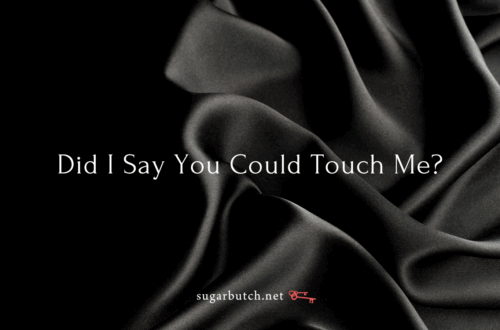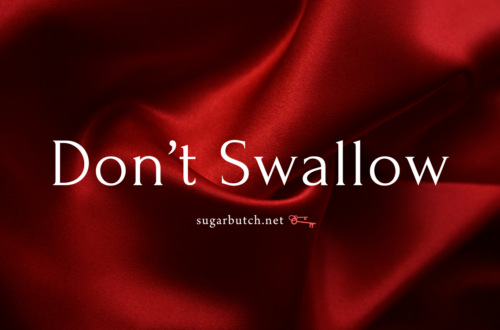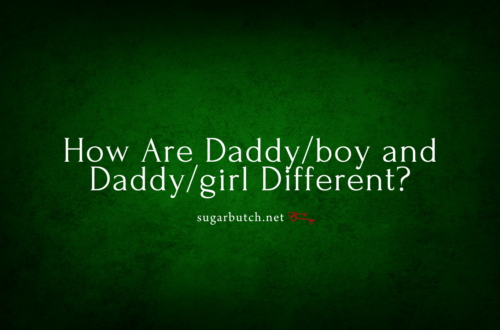Way back in April, for Sugarbutch’s third anniversary, I offered up an “ask me anything” thread where readers could ask any burning questions that they’d like for me to answer. Given that I’m writing so much these days my pencils are worn down to nubs, and that this summer has been a challenge, I’m behind on answering many of those questions.
Here’s one that I’ve thought about since I read it.
What are your working definitions of “butch” and “femme”?
I know that’s a tricky and possibly annoying question; I ask because I’m currently moving into the recovery phase of a recent gender panic/gender identity crisis. I’m in the process of moving to a more masculine gender presentation and (hopefully?) social role (thank God), and my girlfriend is femme (and I pretty much only like femmes), but then I don’t feel like my gender issues and vibes are very similar to those of the butches I know, and… I’m just really confused.
– Daisy
I do have somewhat of a working definition of these terms: usually I say, in the broadest sense, butch and femme are intentional reclamations and recreations of gender. There’s more to it than that, of course, and these identities are policed by all sorts of social and gender forces. But that’s a start.
But that’s just my brief two cents. I want to know: what are your interpretations of these butch and femme? What are your working definitions?
Say you run into someone who has no knowledge of what being part of butch/femme culture and what identifying as butch or femme means (which, I don’t know about you but, is very frequent for me). Or someone who has only come across these terms as pejorative? What do you tell them?
Or, think about it this way: living in New York City has taught me the strong value of the elevator pitch. Everybody’s busy, everybody’s got somewhere else to be, someone else to talk to, which is more interesting than you. So you’ve got to hook them in with something strong and solid.
So what’s your butch/femme elevator pitch? How do you explain the basics in one sentence?
I’ll have to keep thinking about mine. I’ll chime in in the comments.




Butch and femme are identities that take traditional gender roles and fuck them until they cum so hard they turn inside out, and that’s just the start.
They’re style clusters mobilized for mood, ethos, eros.
The problem with the definitions so far is that if you didn’t know the difference between butch and femme before, you won’t be any wiser after.
Whoa! I'd totally forgotten that I asked that. In the meantime I've started identifying as butch and it's been one of the best experiences of my life. It's almost hard to remember my state of mind when I wrote that, though it was only six months ago.
in the broadest sense, butch and femme are intentional reclamations and recreations of gender
I really like this and I think it's right on, but it's a description, not a definition. We might say this of a lot of things — some straight people might intentionally reclaim/recreate gender, and that might be lovely, but it wouldn't make them butch or femme. So what are the qualities that distinguish butch & femme from other gender identities? How do we know butch or femme when we see it?
I'm trying really hard to figure out how to articulate those things without stepping on any toes or excluding anyone who shouldn't be excluded. For example, I want to say that butch and femme are the identities of queer women, or that they're specifically female — but does that exclude butches who don't identify as women? Also, I don't think butch and femme are possible on cis male bodies, but it is imperative to include trans women, and I'm really confused about whether and how to include trans men (aren't we all).
Anyway, I'll give it some thought.
"For example, I want to say that butch and femme are the identities of queer women, or that they’re specifically female — but does that exclude butches who don’t identify as women?"
I think that yes, that does exclude butches who identify on the transmasculine spectrum. It also excludes trans women who may identify as either butch or femme. I just think its tricky whenever you define one identity as being exclusive to some other identity or group. I remember reading somewhere on here when I first discovered sugarbutch something sinclair said about defining identity categories/labels in inclusive rather than exclusive ways.
And also, of course they have different meanings and connotations- but "butch" and "femme" are both used in the gay men realm. From what I understand its more of an adjective usage than noun, but I am all about queer unity across lines of gender and genitals, so saying that butch/femme is ONLY something of dyke culture effectively alienates many of our queer family relatives.
i think your definition is great. i tend to use the word "celebration" when describing my femme. which, i think, is another way of saying – or one aspect of – "intentional reclamation." the idea of celebrating my femininity is important to me because i never *opposed* it, even when i was a "boy," but it just was – just there, as compared to good, important, exciting…
i definitely don’t want to define these words in terms of who can use them or not. i also think that in the definitions should be some clue of what we’re really talking about, which is claiming some sort of intentional masculinity (butch) and femininity (femme)…
Freedomgirl,
i also think that in the definitions should be some clue of what we’re really talking about, which is claiming some sort of intentional masculinity (butch) and femininity (femme)…
Yes! The thing is that this is critical in order for it to even be a definition in the first place.
I didn't mean to imply, in my comment above, that I want to exclude people. It's just that what makes identities useful as identities is their specificity. If that weren't true, there would be no need for anyone to identify as anything beyond "human."
I'm Jewish, and this sort of remind me of conversations about who is Jewish. There are ways of defining Jewishness that are shaming and that unfairly exclude people. But if we can't define "Jew" at all — if no one is ever excluded — then the Jews as a people don't exist.
A definition I've read on this website before was butch is masculine presentation on a female body, while femme is feminine presentation on a female body… I've heard "butch" used outside of the lesbian spectrum to describe men and that definition (masculine presentation – minus "on a female body") still worked.
I think my favorite definition of femme you quoted on your blog, I'm paraphrasing here, but it was something like femme is a way of making "girl" not hurt. That really hit home for me. I used to say I wish I could be a drag queen because I have a love of flamboyance and bright colors and over the top-ness, but couldn't reconcile wanting to present as feminine with feeling like i was capitulating to what society wanted me to look like. By identifying as femme I feel in control of my gender, if that makes sense. I make me. I construct me. I decide what everyone else sees and I like it, so it doesn't really matter what they think.
"Butch" and "femme" describe gender presentation towards the traditionally "masculine" and "feminine" sides of the spectrum. They can apply to anyone and they're binary; lots of people don't identify as either butch or femme.
Any thoughts? I'd welcome a critique of this "elevator pitch"
I like what Ladycakes had to say. I'd like to add that having a butch "audience," real or implied, has been integral for me in forming a kind of femininity that I can enjoy without feeling compromised. The first time a butch woman showed her appreciation for my femininity, it changed things for me.
Ladycakes, OMG, yessssss! I didn't, couldn't, OWN my femininity until I knew myself as a lesbian. In this identity, by rejecting the original intent of gender (to create and maintain heterosexuality/normativity), I finally could. It felt liberating in a way that I don't think heterosexual feminists can relate to. Oooooo, and I simply ADORE being over-the-top! CAMP! So yeah, now my presentation is mine, allllll MINE.
"Also, I don’t think butch and femme are possible on cis male bodies, but it is imperative to include trans women, and I’m really confused about whether and how to include trans men (aren’t we all)."
I respectfully, but strongly, disagree. Butch and femme are identity labels that have as long a history in gay and bi men's communities as they do in lesbian communities. There's nothing productive that comes from excluding queer, cis men from this conversation/discourse/identity. Do you really think that bears and leather daddies aren't intentionally performing, reclaiming, and celebrating masculinity? What makes that substantially different from "butch" in the sense that it's used here? Absolutely nothing, in my opinion.
Not to mention, that including cissexual/cisgender men really, really easily solves the "problem" of whether or not transsexual/transgender men can be included. The resistance to queer cis men in all of this continues to boggle me. Is it just a case of "eww, (cis) boy cooties?"
LeeOrLeigh: I like that definition, and I'm sincerely curious about the "can apply to anyone" part. Can straight couples be butch/femme?
Ephraim: those are good points and I'm happy to cede them. My personal experience of butch and femme continues to be specific to the queer women's community, but that's just my perspective, not some innate truth about the words.
I want to emphasize that I said "experience" and not "definition." Though I have many queer male friends, I honestly don't see them using these words in the same ways queer women do. That is, I don't see them using them as nouns (identities). It's entirely possible they do, just not in my circles.
Actually, LeeOrLeigh, rereading your definition — wouldn't that sort of make all traditionally-gendered straight couples butch/femme (since there are no caveats about intention, reclamation, etc)?
Sure, I don't see why not. There are a lot of heterosexual couples that I would describe as butch/femme, butch/butch, or femme/femme. Not necessarily the male being the butch and the female being femme either. But I think the sense of "butch"' and "femme" comes from the stereotype of traditional relationships. Butch is a noun for masculine traits, which are described as masculine because we traditionally associate them with males.
Alright then.
Well, keeping in mind that this is supposed to be an elevator pitch, and I've got roughly 30 seconds or so to try to enlighten whomever is asking, I'm completely on board with LeeOrLeigh's take. Sure, we can dig deep into the details, but I'm a fan of concise, clear speech (as you can tell by this rambling comment); the less you can confuse someone, the more you can educate them. And yes, I think that it can apply to anyone who is gendered (I've met people who say they are neither).
I respectfully disagree. If butch and femme are simply euphemisms for masculine and feminine behavior/appearance, what's the point? Particularly given the rather murky context of gender-queer identities, reducing the terms butch and femme to synonyms of already existing concepts doesn't seem to add anything to the conversation.
My definitions of butch and femme require both intentionality and some manner of heternormative transgression.
I second undercover punk.
I was thinking about this post the other day. I understand "intentionality" is an important part of the sugarbutch journey, but I don't think it's necessary for every butch or femme (unless I'm misunderstanding the word "intentionality"). I know many butch women for whom butch was a natural presentation that they don't theorize about.
I agree that butch/femme can be used in gay male culture, and that they don't really usually apply to het relationships so my working definition would be something like:
Queer gender presentations that incorporate and reclaim aspects of traditionally masculine/feminine gender presentation and/or roles.
This modification might unintentionally exclude but:
For many people who identify with these labels, identifying is described either as freeing or coming home – butch and femme are usually identities that people grow into. It may be a choice, but at the same time, the other identity may not be a viable option for that individual.